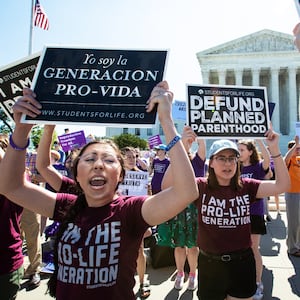Almost as quickly as it was stopped, the infamous Texas abortion law was back again.
The Fifth Circuit Court of Appeals blocked a temporary injunction on Texas’ controversial six-week abortion ban Friday, once again barring most pregnant people in Texas from accessing the service.
The injunction came down late Wednesday night from U.S. District Court Judge Robert Pitman, in response to a lawsuit filed by the Department of Justice challenging the Texas law. In his ruling, Pitman said the law—which allows private citizens to sue anyone who provides an abortion after fetal cardiac activity can be detected—had “unlawfully prevented [women] from exercising control over their own lives in ways that are protected by the Constitution.”
“This court will not sanction one more day of this offensive deprivation of such an important right,” he wrote.
Texas immediately appealed the ruling to the notoriously conservative Fifth Circuit, which issued a temporary administrative stay against the lower court’s preliminary injunction late Friday.
The court back-and-forth sent abortion clinics in the state—some of which have stopped providing abortions altogether since the law took effect Sept. 1—into a state of confusion, unsure of how long the reprieve from the restrictive law would last. Planned Parenthood and Whole Woman’s Health, the two largest providers in the state, were both waiting to see what the Fifth Circuit would do before deciding if they would resume abortions past six weeks.
The Texas law—the most restrictive abortion ban in the country—has stymied reproductive rights advocates who attempted to block it through the courts. Because the law is enforced by private citizens, and the state, it has evaded multiple legal challenges—including an emergency appeal to the U.S. Supreme Court.
Several other challenges to the law are pending, including one filed on behalf of Planned Parenthood, Whole Woman’s Health, and other providers in the state that is expected to be heard by the Fifth Circuit in December. So far, only one provider, Dr. Alan Braid, has been sued for providing an abortion past the legal limit. Both plaintiffs in those cases said they sued not to stop Braid from providing abortions, but to give advocates another opening to challenge the law.
The law has already had a devastating effect on people seeking abortions. One Planned Parenthood in the state went from providing 205 abortions the week before SB8 took effect to only 52 the next, according to the Justice Department. Meanwhile, clinics just outside the state saw double the amount of patients they usually treat, most of whom were from Texas.







